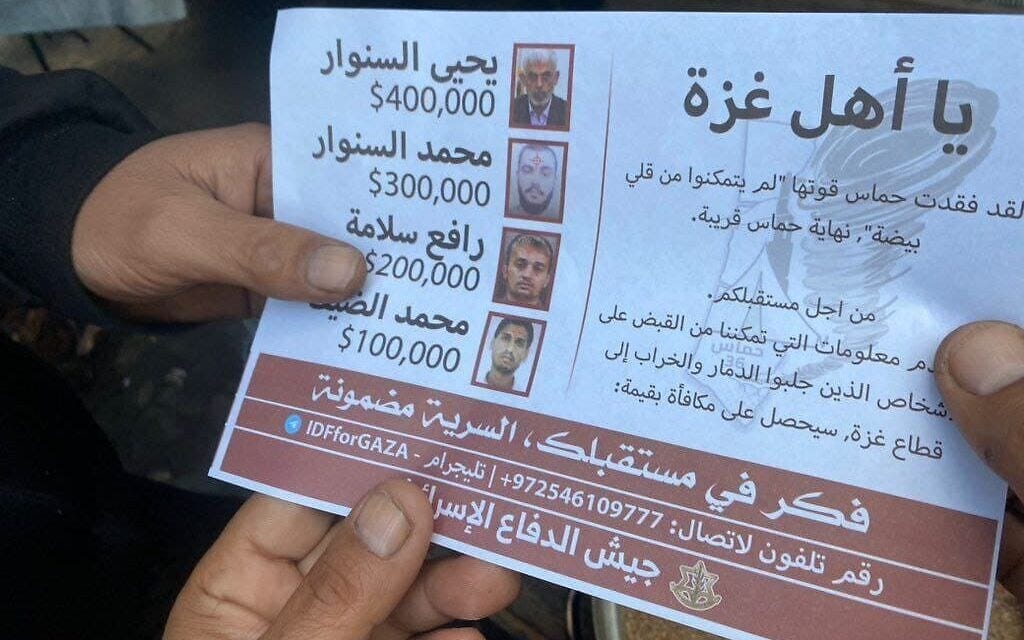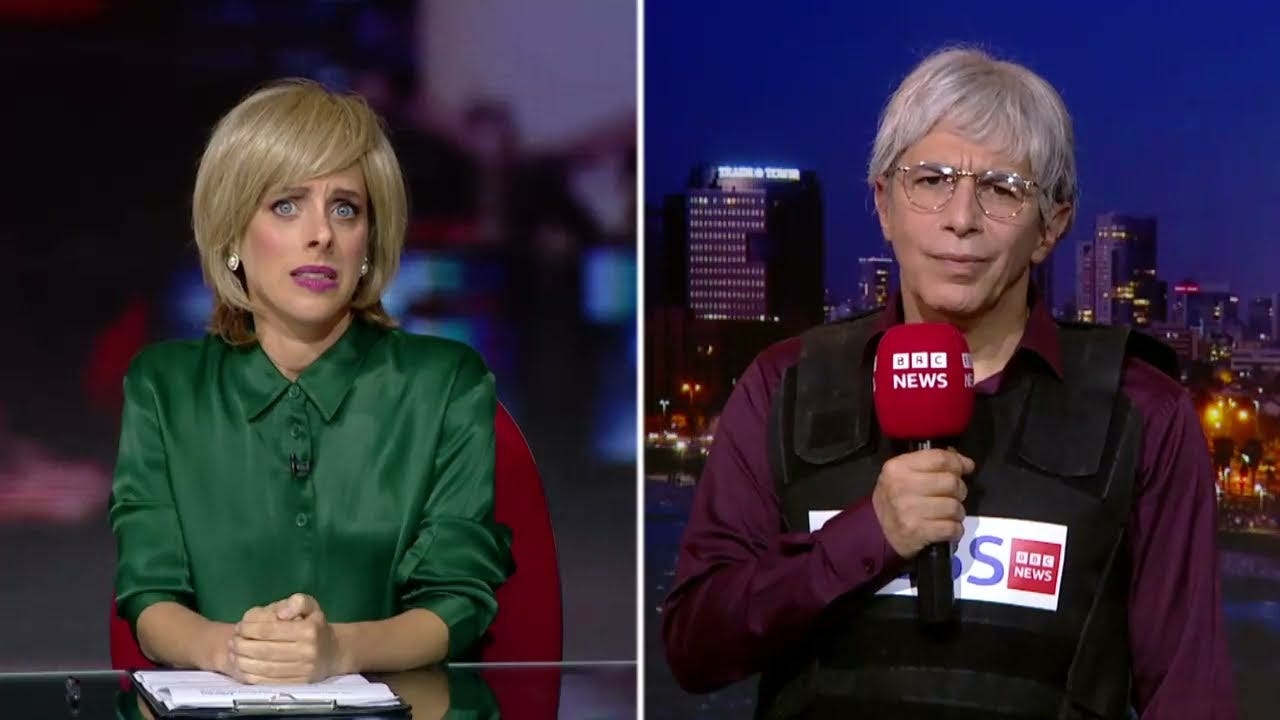The Three-Faced War That Hamas Is Fighting
Or, at least, attempting to fight.
Please consider supporting our mission to help everyone better understand and become smarter about the Jewish world. A gift of any amount helps keep our platform free and zero-advertising for all.
You can also listen to the podcast version of this essay on Apple Podcasts, Google Podcasts, or Spotify.
Imagine you’re the CEO of a company, and you’ve organized in such a way that you effectively have to put on three different faces: one to your employees, another to your customers, and yet another to your shareholders.
This is the position that Hamas has placed itself in, a desperate and awkward quagmire that is quickly becoming a train-wreck in the making.
For audiences across the West, Hamas wants the narrative to revolve around the “poor” and “uninvolved” Palestinians who are “indiscriminately” being “bombarded” by the excessively mighty and oppressive Israeli military. Oh, and the destruction of Gaza’s civilian infrastructure like schools, mosques, international organizations’ offices, and otherwise “regular” buildings. But nothing else.
In crafting this narrative, Israel increasingly faces international pressure, thus damaging its war efforts to eradicate Hamas’ governing and military power from the Gaza Strip. After all, “the war of information” is the only war that Hamas can remotely come close to winning, or at least drawing a truce.
Within this “war of information,” Hamas does not want Western audiences to see or feel the war that it deliberately launched on October 7th, and that was preceded by other vehicles of Palestinian terror, both explicitly and implicitly tied to Hamas.
In times of “peace and quiet,” Hamas will flaunt its collection of munitions, but during this war, it’s as if there is no military in Gaza whatsoever, just a bunch of helpless and hopeless Palestinians, a perception that neatly fits into the terror group’s “war of information.”
Hamas does its best to keep combatant casualties from going public, hence why it commingles the civilian and combatant casualty counts into one big, overwhelmingly inflated number. Even if the number 20,000 Palestinian casualties is accurate, Israel claims to have killed around 6,000 terrorists, which would equate to a 2.3-to-1 civilian to combatant ratio, an unfortunate but nonetheless impressive number.
But when it comes to Hamas’ talking heads on Western channels and platforms, that’s neither here nor there. In fact, they utterly refuse to talk about the war or October 7th, constantly deflecting questions about:
Hamas’ tunnel network
Hamas’ sources of financing
Hamas’ wartime misappropriation of civilian aid and prewar misappropriation of billions of dollars of international aid
Hamas’ political elite living lives of opulence outside far away from Gaza
Hamas’ wartime tactics like indiscriminately firing rockets at Israeli cities and using Palestinian children to scout IDF positions
Hamas’ abuse of civilian infrastructure like hospitals and schools
The complicity and do-nothingness of international organizations (notably the UN Relief and Works Agency for Palestine Refugees and International Red Cross) and the involvement of their personnel with Hamas
The IDF’s remarkable efforts to minimize civilian casualties while achieving perfectly legal war aims
In this way, the strategy is so simple, a first grader could do it: Just repeat the same line every time. “It’s all in the name of Palestinian liberation.”
Hamas and its associates aren’t the first to use the trick — if you repeat something enough times, it must be true. Ultimately, Hamas knows that even the most “respected” media outlets like the BBC and New York Times are eager to overlook or under-report all of the terror group’s war crimes, in favor of coverage about an off-the-cuff assertion by an unimportant Israeli politician or retired general.
If it makes Israel look like the big bad beast, jump all over it and amplify. If it makes Hamas or the Palestinians look unbecoming, then downplay, bury the lede, or just outright ignore.
All this is designed to serve Western audiences’ robust confirmation bias: Israel is a brutal regime with agency, while the Palestinians are innocent and agency-less victims.
For Arabic-speaking audiences across the Middle East, and Hebrew-speaking ones in Israel, Hamas is after an entirely different image, one that shows “successful” attacks on IDF soldiers and the plight of Israeli hostages, which it calls “prisoners of war.” For Arabic-speaking audiences, this strategy is meant to enhance Hamas’ regional standing. Headlines include:
The income of 20 percent of Israelis has declined since the Al-Aqsa flood (what Hamas calls its attacks on October 7th)
Israeli army reserve soldiers: The situation is unbearable on the northern front
The resistance bombs the occupied Lebanese village of Jerusalem
Qassam missiles in the heart of Tel Aviv
Gaza’s prolonged truce: Tactical gain for Hamas, global scrutiny for Israel
In Israel, meanwhile, Hamas’ strategy is none other than unapologetic psychological warfare — with the aim of “inspiring” Israelis to put pressure on their government to strike another “humanitarian ceasefire” in exchange for Israeli hostages. Hence why it regularly releases hostage videos and leaves dead bodies of hostages for the IDF to find, a sort of game that Hamas knows it can easily play with an overly humanitarian Israeli populace.
Then, and finally, there is the narrative that Hamas tries to craft among Palestinians, both in Gaza and the West Bank. It has seen a major boost in popularity in the West Bank since October 7th at the rival Palestinian Authority’s expense, yet reports this week suggested that senior Hamas officials are in daily contact with top Palestinian Authority officials, about an alliance under the umbrella of the Palestine Liberation Organization.
Uncomfortably, both parties have real incentives now more than ever to unite (or face political death, each for different reasons). This is especially true for the Palestinian Authority, which has increasingly represented less and less Palestinians since it came to be in the 1990s. Its leader, Mahmoud Abbas, is nicknamed “the Mayor of Ramallah” since that’s all he really controls.
Hamas, meanwhile, incessantly uses terminology like “our people” and “the Palestinian home” — even though the terror group has done next to nothing to protect civilians, uses them as human shields, and violently diverts trucks bringing humanitarian aid into wartime Gaza.
But Hamas won a parliamentary majority in what turned out to be Gaza’s last election — in 2006 — not on an incendiary platform to “kill the Jews,” but as the “party of change and reform.” After years of rule by Abbas’ widely unpopular and corrupt Fatah party, a vote for Hamas was a vote against Fatah (which runs the Palestinian Authority).

What’s interesting, though, is that most people in Gaza, where roughly half the 2.2 million population are under 18, were either not yet born or don’t have an actual memory of the last time there was an opportunity to express a political will.
And while many Palestinians do not publicly speak out against Hamas, surveys taken before the war showed that most Gazans had a poor opinion of how Hamas handled things they valued the most: access to food, education, healthcare, living conditions, and jobs. These surveys, conducted by Arab Barometer, a non-partisan network of U.S.-based researchers working with local partners across the West Bank and Gaza, revealed that a healthy majority of Gazans — 68 percent — believed they had no way to safely participate in peaceful protests against Hamas’ rule.
They were also more likely to blame Hamas leadership than Israel for material shortages in their lives despite a nearly two-decade blockade from Israel and Egypt that has affected every aspect of life for Palestinians in Gaza — from where they can live and study, to where they can travel and what healthcare they can access.
According to the Arab Barometer survey, some 73 percent of Gazans favored a peace deal with Israel. Hamas might be realizing that, after running the strip like its own personal fiefdom for the last 16 years, a political arrangement with Israel (the country it has venomously vowed to destroy) might actually be in its best interest.
Just last week, Moussa Abu Marzouk, a prominent member of Hamas’ political bureau, said that the terror group would be open to recognizing Israel in order to fall into line with the position of the Palestine Liberation Organization.
“You should follow the official stance,” said Marzouk, referencing the position adopted in 1993 under the Oslo Accords, in exchange for Israel’s recognition of the group as the legitimate representatives of the Palestinian people. “The official stance is that the PLO has recognized the State of Israel.”
Should a Palestinian Authority-Hamas merger and subsequent “two states for two peoples” situation unfold, this would completely play into Hamas’ favor. October 7th would become, in Palestinians’ minds, “the day that Palestine was reborn” thanks to Hamas’ unbelievable attacks.
As a matter of fact, 75 percent of Palestinians said in a poll that they either “strongly supported” or “supported to some extent” the October 7th attacks carried out by Hamas.1
Adeeb Ziadeh, a West Bank-born international affairs expert who researches Hamas and now teaches at Qatar University in Doha, hypothesized that “one of the main drivers for Hamas to do what it did in Israel on October 7th may have been it felt it had nothing to provide for the people in Gaza any longer.”2
“Maybe it believed the patience of people in Gaza with Hamas had run out,” said Ziadeh. “Maybe it felt it had nothing to lose when it was no longer able to help them with their needs.”
In Israel, Prime Minister Benjamin Netanyahu is known as “the magician” for his knack of weaving in and out of political dilemmas. Hamas might give Bibi a run for his nickname when it’s all said and done.
“Wartime Poll: Results of an Opinion Poll Among Palestinians in the West Bank and Gaza Strip.” Arab World for Research and Development (AWRAD).
“'Self-silencing': For Palestinians, talking about Hamas comes with hazards.” USA Today.




They are despicable cowards and are covered by evil!!! I feel so strongly about this. You have God on your side and so many ARE behind you.
Do you see Abu Marzouk as a potential partner with whom Israel might agree to a modus vivendi if not a peace agreement?